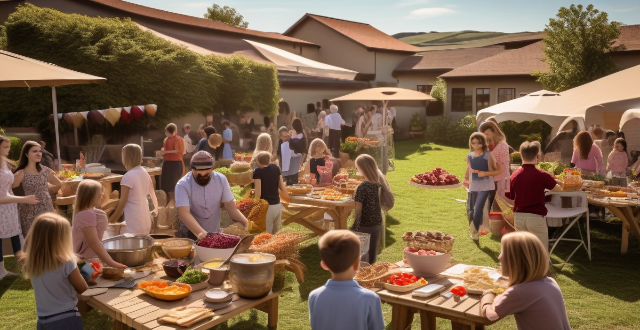Local food festivals promote regional cuisine by showcasing local delicacies, offering educational activities like cooking demonstrations and cultural presentations, supporting the local economy through vendor sales and tourism, building community pride and social connections, generating media buzz, and facilitating direct interactions between producers and consumers. These events contribute to the preservation and celebration of culinary heritage while enhancing a region's economic and cultural growth.

How Do Local Food Festivals Promote Regional Cuisine?
Local food festivals are a vibrant and engaging way to celebrate and promote the unique flavors of a region. These events not only offer a platform for local chefs and food producers to showcase their talents but also serve as a cultural exchange that can enhance tourism and community pride. Below are some ways in which local food festivals contribute to the promotion of regional cuisine:
Introduction to Regional Specialties
Highlighting Local Delicacies
Food festivals often focus on dishes that are signature to the area, giving attendees an authentic taste of the region. This introduction can pique interest and inspire people to seek out these foods in local restaurants or markets.
Educating Attendees
Cooking Demonstrations and Workshops
Many festivals include cooking demonstrations where local chefs share recipes and techniques, educating visitors about the culinary traditions and methods specific to the region.
Historical and Cultural Presentations
Some festivals may also incorporate talks or exhibits that explain the historical context and cultural significance behind certain dishes, offering a deeper understanding of the regional cuisine.
Encouraging Local Economy
Supporting Local Businesses
Vendors at these festivals are typically local farmers, food artisans, and small business owners who benefit directly from the increased exposure and sales.
Attracting Tourists
Food festivals can draw visitors from outside the region, boosting tourism and spreading awareness of the local cuisine beyond the area's borders.
Building Community
Bringing People Together
Food festivals provide a social setting where community members can gather, strengthening bonds and shared identity through a common appreciation of local food.
Fostering Pride
Residents often feel a sense of pride seeing their regional cuisine celebrated, which can lead to a greater appreciation and preservation of culinary traditions.
Media and Marketing Opportunities
Word of Mouth and Social Media
The buzz created by food festivals, especially through social media shares, can generate significant word-of-mouth marketing for regional cuisine.
Media Coverage
Local and national media coverage of food festivals introduces regional cuisine to a broader audience, potentially leading to increased recognition and popularity.
Direct Interaction with Food Producers
Farmers Markets and Artisan Booths
Interactive elements like farmers markets allow visitors to meet the producers, learn about their methods, and taste their products firsthand.
Feedback and Adaptation
Direct interaction provides valuable feedback to producers, helping them adapt and improve their offerings based on consumer preferences.
In summary, local food festivals play a crucial role in promoting regional cuisine by offering a taste of local specialties, educating the public, supporting the local economy, building community, leveraging media opportunities, and fostering direct interactions between producers and consumers. Through these diverse activities, they help preserve and celebrate the culinary heritage of a region while also contributing to its economic and cultural development.